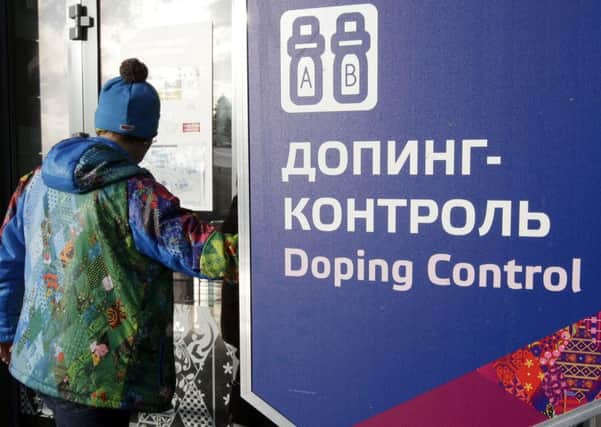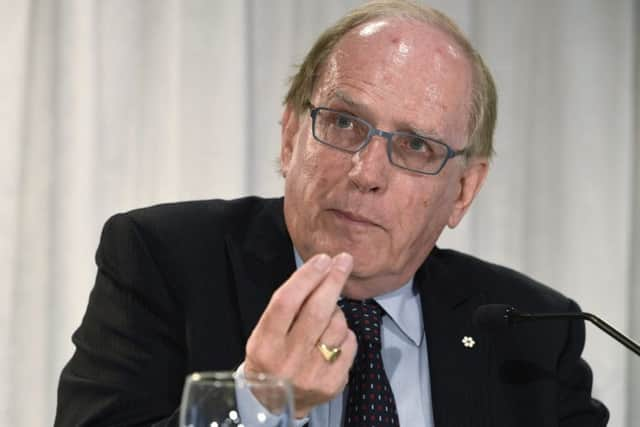Is it time to accept that athletics will never be free from drugs?


It began with ex-director of Moscow’s anti-doping lab Grigory Rodchenkov overseeing the creation of an alcohol-infused cocktail of steroids that would be harder to detect as drug testing methods improved. But that was just the start of the scandal which has enveloped not just Russian, but world athletics.
Over four years the state sponsored doping scheme benefitted athletes from more than 30 sports across a variety of events, but it was at the 2014 Winter Games in Sochi that the situation escalated.
Advertisement
Hide AdAdvertisement
Hide AdDetermined to do better than the previous Winter Olympics in Vancouver, where Russia had finished a disappointing 11th in the medals table, Rodchenkov, along with various members of the secret service hatched a plan that saw positive samples smuggled out through a ‘mousehole’ drilled in the wall of the testing lab.


Collected by an agent posing as a plumbing contractor they were emptied and refilled, with those involved taking care to ensure these bogus samples matched the specific gravity recorded on the label by the addition of salt or distilled water.
Whether he had a crisis of conscience or thought it was better to come clean before he was exposed, Rodchenko later confessed to his part in the doping campaign. With his admission, Pandora’s box was opened. An investigation was ordered and the 103-page report published by Richard McLaren this week laid bare in minute, absorbing detail just how Russia had tried to fool the rest of the world.
The question now is what next? The Olympics and athletics in particular is no stranger to drug scandals. From Ben Johnson through to Marion Jones and Tyson Gay hundreds of athletes have fallen from grace. With each new case the reputation of the sport has got that little bit dirtier, and with current testing procedures clearly inadequate is it time to accept that the greatest games on Earth will never be drug free?
Advertisement
Hide AdAdvertisement
Hide Ad“Currently two per cent of all athletic samples test positive for performance enhancing substances,” says Dr Tom Bassindale, a lecturer in forensics and analytical science at Sheffield Hallam University. “The best research I have read puts the actual number of athletes using banned substances at between 20 and 40 per cent. Clearly the current testing procedure isn’t working. It’s not picking up the athletes who are flouting the rules and therefore it’s not acting as a deterrent.


While the rules differ country to country, the majority of testing happens at major events. Logistically and financially it makes sense to test when all elite athletes are gathered in one place, but it also reduces the chances of catching those who are doping.
“Anabolic steroids account for half of all cases of doping,” adds Dr Bassindale. “If you take tablets they can be washed out of an individual’s system within days and even injections will be largely undectable after a month or so. However, even when the last trace has gone, an athlete will still benefit from longer-term gains.
“That’s why there is certainly a persuasive argument for more money to be invested in pre-season testing as you are for more likely to get positive results outside of the major competitions. By the time the curtain goes up on an Olympics or a World Championship, athletes are already one step ahead of the drug testing authorities.”
Advertisement
Hide AdAdvertisement
Hide AdPressure is now mounting on the International Olympic Committee to make an example of Russia by banning the entire team from the Rio Games. However, with a decision on Russia’s appeal against the International Association of Athletic’s Federation ban of its track and field team due tomorrow, the IOC executive borad has asked for more time to consider its options.
“If you read the McLaren report, the scale and extent of the Russia scandal is unlike anything we have ever seen before, but I don’t think anyone would risk saying that this is a one-off,” says Susan Backhouse, professor of psychology and behavioural nutrition at Leeds Beckett University. “The challenge is that elite sport is driven by money, it’s driven by tables and medals and it has a political dimension.
“However, it also has rules and while there will always be individuals who break those rules, I don’t think we should roll over and just accept doping as part and parcel of professional sport. What we do need to do though is change our approach and accept that the current detect and deterrent method of drug testing isn’t working.”
There are five classes of banned drugs, the most common of which are stimulants and hormones. According to the UK Anti-Doping Agency, substances and methods are banned when they meet at least two of the three following criteria: they enhance performance, pose a threat to athlete health, or violate the spirit of sport.
Advertisement
Hide AdAdvertisement
Hide AdThose found guilty of doping have been stripped of medals, been issued with lifetime bans and seen lucrative sponsorship deals disappear overnight. Being outed as having used performance enhancing drugs more often than not ruins a career, but the impact of doping on those who have played by the rules is much harder to quantify,
“We have done research with individuals who lost out on medals and the long term consequences, not just financially, but emotionally last a lifetime,” says Prof Backhouse. “Their voices are ones which are not often heard, but they told us not only how they had missed out on prize money, but also lost opportunities for public recognition and glory.
“Many of them feel, understandably, that they were denied certain opportunities because they played fairly. While few would have wanted to conduct their career any differently, they have to live with those questions of ‘what if’ for ever.”
Random drug testing will only ever identify a minority of culprits and Prof Backhouse is among a growing number of experts calling for a seachange in the way anti-doping efforts are approached.
Advertisement
Hide AdAdvertisement
Hide Ad“One thing we need to look at is how we do testing based on intelligence,” she says. “We need to create an atmosphere where people not only feel able to come forward with concerns, but where those whistleblowers aren’t villified for speaking out and made to feel like they are no longer part of the sport.
“We need to create an atmosphere of social responsibility. If people feel able to confront an individual athlete or coach who they suspect is involved in doping then the problem can actually be stemmed at source. Right now, that has to be the way forward.”